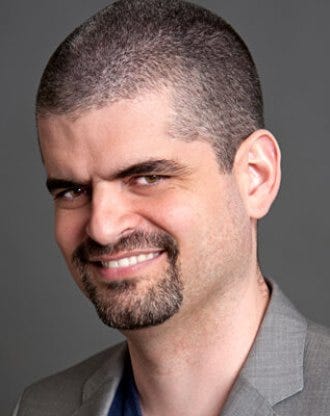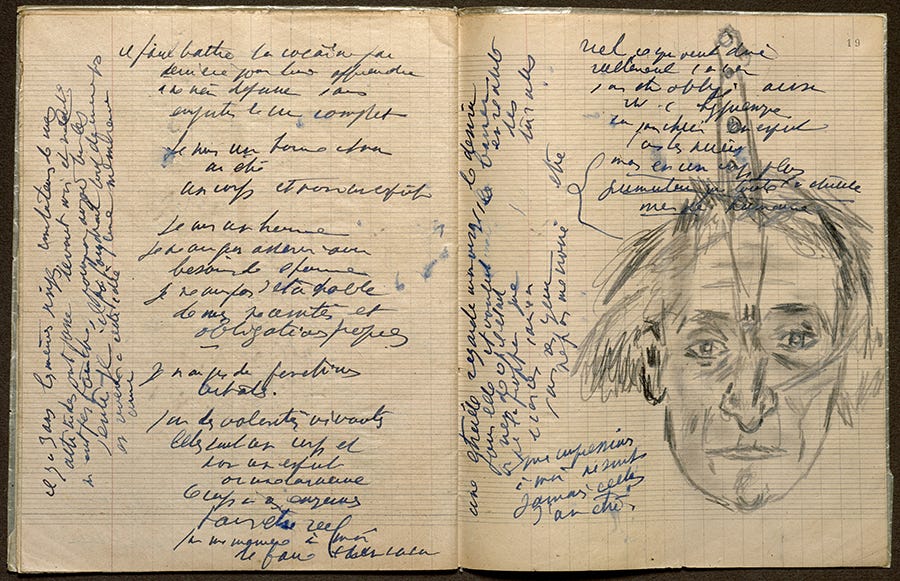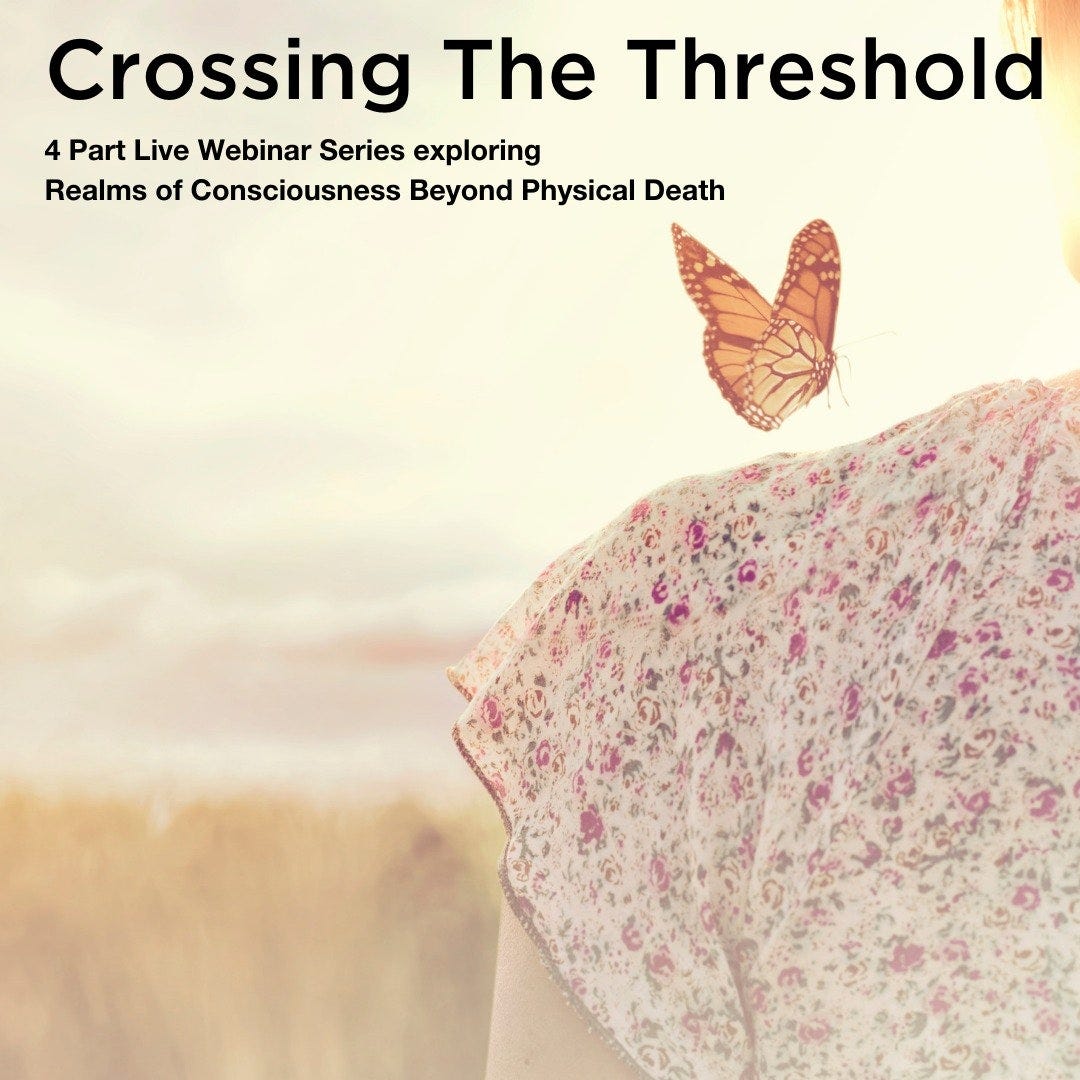From Capitalist Realism to Anarchist Idealism, Part One
From one dissociated projection of universal consciousness to another
This illustration above was made by Emer Morrissey, inspired by my Crossing the Threshold seminar. (His email if you want to reach out: e.m.morrissey@protonmail.com ).
This is Part One of an ongoing thought stream. Here are links to Part Two, Part Three, and Part Four. See info about new courses at the bottom. A new month-long writing workshop starts next Weds. Please join us. 25 people max.
Analytic Idealism
I found it an electric, idiosyncratic delight to teach my month-long seminar, Crossing the Threshold, which ended last Sunday. We covered a wide range of topics relating to the afterlife, such as reincarnation, near death experiences (NDEs), DMT trips, phantasms/ghosts, and detailed descriptions of life in the afterworld, as channeled through mediums or extracted via hypnotism. I was voraciously researching and learning throughout the month. Along the way, I discovered the philosopher Bernardo Kastrup, author of The Idea of the World and Why Materialism is Baloney, who calls himself an “analytic idealist.”
Bernardo Kastrup, author of The Idea of the World
Trained as a computer scientist as well as a philosopher, Kastrup worked at CERN, seeking to imbue Artificial Neural Nets with self-awareness or consciousness. Over time, he realized that all efforts to solve this problem presumed the existence of consciousness as an a priori. This led him to reconsider what is commonly called “The hard problem of consciousness” — how does self-awareness arise from the “bits,” or quantum blips, of material phenomena? He finally reached the insight that this problem disappears (as do many otherwise insoluble problems and paradoxes) when we begin from the thesis that mind or consciousness is the fundamental or primordial basis of reality, and everything we experience as reality arises within this unitary, instinctive consciousness.
Subscribers get reduced-price access to seminars and online events, and allow me to keep giving away my written work without resorting to paywalls. Soon we will start regular free calls for paid subscribers.
As a great many other thinkers have also realized, this actually far makes more sense, phenomenologically. After all, everything we experience, we can only experience through the medium of consciousness. The objects or “images” we encounter in the world can be considered projections on the “screen” of consciousness. They are vibrations or “excitations” that we perceive through our sense organs, which our brains transform into recognizable patterns so that our mind can grapple with them. Even the thought that there are “real” things, separate from our perception of them, is ultimately just another thought. And in fact, the last century of physics has shown — over and over again, in myriad experiments — that the “real” world only comes into existence when a conscious observer makes an observation, causing the collapse of probability waves into a momentarily stable form.
As Kastrup puts it in an interview:
The defining tenet of idealism is the notion that all reality is in a universal form of consciousness — thus not bound to personal boundaries — arising as patterns of excitation of this universal consciousness. Our personal psyche forms through a process of dissociation in universal consciousness, analogous to how the psyche of a person suffering from dissociative identity disorder (DID) differentiates itself into multiple centers of experience called alters.
As I have proposed for many years, Kastrup notes that the paradigm shift from the currently dominant (yet hopelessly naive and outmoded) reductive materialist or physicalist worldview to analytic or monistic idealism has far-reaching, profound consequences for humanity’s future. He writes:
Our metaphysical views, even if implicit and unexamined, color every aspect of our lives, from our moral values to our sense of meaning. The notion that existence, at its most fundamental level, is sentient and unitary has tremendous implications for how we regard each other, the planet where we live and the universe at large.
Kastrup and I agree that one of the most crucial aspects of the shift from a physicalist / materialist to an idealist worldview is how it transform one’s concept of death (and, with it, one’s ideas about life). He writes:
If life is the extrinsic appearance of dissociative processes at a universal level, then death — the end of life — is the end of dissociation; that is, the re-integration of our conscious inner life into a broader context. In an important sense, this flips our understanding of death upside-down: Death is no longer the end or infinite constriction of consciousness, but precisely an expansion… If idealism is correct, it implies that, instead of disappearing, conscious inner life expands—whatever new phenomenality this expansion may entail—upon bodily death. This prediction finds circumstantial but significant confirmation in reports of near-death experiences and psychedelic trances, both of which can be construed as glimpses into the early stages of the death process.
Kastrup notes that NDEs and certain psychedelic experiences seem to support this view. I would say, particularly, the two forms of Dimethyltryptamine, at high enough doses, give many people a direct experience of other “dimensions,” or potentials within consciousness, beyond what we currently know or understand.
Personally, I believe we will never be able to overcome our current form of “zombie Capitalism” without a new, coherent, collectively shared metaphysics. The inertia of the system is too overwhelming to confront without an alternative that challenges the dominant framing of reality at the most fundamental level. In other words, any viable alternative to hyper-individualist “post-Fordism” has to go beyond revealing how a truly liberated and equitable society can function politically and technically (models that still need to be built): It must reach the deeper strata of meaning, intention, and purpose where people find the drive and courage to go beyond their limits. Beyond a new “how,” we first need a new “why.”
(Whether I feel optimistic that such a movement could, in fact, erupt in our time is a different question. It seems unlikely, but anything can happen at any moment).
Lacking a new metaphysical orientation, the Left has floundered over the last decades — but even all the way back to Marxism, based in “dialectical materialism.” I agree with the tormented poet Antonin Artaud. Already in the 1920s, Artaud wrote, “There is a secret determinism based on the higher laws of the world; but in an age of a mechanized science lost among the microscopes, to speak of the higher laws of the world is to arouse the derision of a world in which life has become a museum.” Artaud was a member of the Surrealists but left the group when its leaders, including Andre Breton, embraced Communism.
As I wrote in Breaking Open the Head:
For Artaud, the fact that the Surrealists joined the communists only proved that their revolutionary impulse had not penetrated deeply enough. “The revolutionary forces of any movement are those capable of shifting the present foundation of things, of changing the angle of reality.” Communism was doomed to failure because it didn’t recognize, didn’t transform, “the internal world of thought.”
Next up, I will explore the implications of this viewpoint via some ideas of Mark Fisher, celebrated author of Capitalist Realism, among other books, who tragically took his own life in 2017.
(Part Two coming soon)
I just concluded the live version of Crossing the Threshold, but you can still purchase the seminar, watch the recordings and access the archive of material I collected on the subject. One participant wrote that the seminar “stretched my mind and deepened my existential pondering… A really beautiful concept altogether and one that has left me deeply inspired. Thank you for all your incredible work, following your passions and be so generous with the resources too.”







I don't know the exact personal context of Antonin Artaud's comments. But his critique of 'communism' is dissatisfying and maybe misses the point, at least if we place it in the larger historical context that includes communalism, socialism, Marxism, anarchosyndicalism, etc. That is because 'communism' has never been a single narrow political ideology but more of a general impulse, attitude, or worldview. The Russian Revolution prior to the Stalinist takeover, for example, resulted in diverse groups with their own ideologies, agendas, and practices.
Even limiting ourselves to communism proper over the past couple of centuries, it has meant a diversity of things and has had a diversity of advocates. This quickly becomes more complex when we include the longer development of communist-like thinking, such as going back to the English Civil War and the Peasants' Revolts, not to mention the wide variety of primitive communism, from early Christian communes to hunter-gatherer tribes. One might argue that anyone who dismissed communism "only proved that their revolutionary impulse had not penetrated deeply enough."